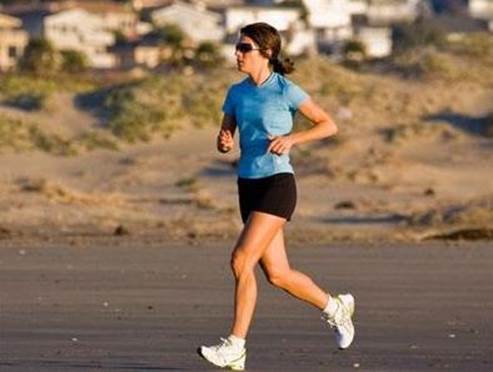You’d think someone fit enough to run
multiple marathons, complete long-distance cycle races or Ironman triathlons
would be the epitome of health. Yet emerging evidence suggests the opposite may
be true. For while there’s no dispute moderate exercise boosts fitness and
heart health, some scientists believe endurance athletes risk permanent damage
to their hearts.
Writing in the journal Heart, US
cardiologists Dr. James O’Keefe and Carl Lavie claim the heart is only designed
for ‘short bursts’ of intense activity. Regularly asking it to overexert itself
for hours at a time, they say, can cause problems. These include overstretching
of the heart’s chambers, thickening of the chamber walls and changes to
electrical signaling, which could cause an irregular heartbeat (arrhythmia).

For
while there’s no dispute moderate exercise boosts fitness and heart health,
some scientists believe endurance athletes risk permanent damage to their
hearts.
Controversially, the scientists claim that,
‘Running too fast, too far and for too many years may speed one’s progress
towards the finish line of life.’ Instead, vigorous exercise should be limited
to between 30 and 50 minutes a day and, ‘If you really want to do a marathon or
full-distance triathlon, it may be best to do just one or a few, then proceed
to safer and healthier exercise patterns.’ In one study, published in the
European Heart Journal, MRI scans were given to 40 people training for
endurance events -a fortnight before, just after the event and a week later.
Researchers found most of the athletes had stretched heart muscles the right
ventricle, responsible for pumping blood around the body, was larger and weaker
than usual – directly after the event. Most made a full recovery after a week
but five showed long-term injury -scarring of the heart tissue and impaired
right ventricle function. It echoes earlier research, published in the Journal
of Applied Physiology, which looked at members of the 100 Marathon Club and
found over half of those examined had some scarring of the heart muscle.
Could it be that humans really aren’t meant
to push themselves to such limits? ‘These studies have looked only at small
groups doing very high mileage,’ says Professor John Brewer, Head of Sport and
Exercise Science at the University of Bedfordshire (who is due to run his 15th
marathon at London this year). ‘For the vast majority of people, running
provides far greater protection from heart and other problems than leading a
sedentary lifestyle. The heart is the body’s most important muscle and it can
deteriorate if it’s not used.’
Four times World Ironman Champion Chrissie
Wellington, author of A Life Without Limits (Constable, $13.5), can identify
with the studies, however. ‘I don’t have any statistics but, anecdotally, I’m
surprised at how many of my fellow pro Ironman triathletes have heart problems,
particularly arrhythmia,’ she admits.

I’m
surprised at how many of my fellow pro Ironman triathletes have heart problems,
particularly arrhythmia,’ she admits.
But as Professor Brewer points out, ‘Most
recreational athletes only do one or two endurance events, then use the
training to consolidate and improve their performance at shorter, more
manageable distances.’
‘The studies highlight extreme cases,’
agrees celeb runner Nell MacAndrew. ‘I wouldn’t want to run a marathon every
day! But I’m not at all worried about those I’ve done. I’m healthier now at 39
than when I was 20. My love of training and competing adds to my overall
wellbeing. I’m pregnant now so I’m powerwalking, swimming and doing weights,
not running. But I’ll definitely do more marathons in future.’
Neither is Wellington worried enough about
the potential risks to stop training. ‘Ironman is my sport and I love it,’ she
says. ‘The body’s not a machine to be bent to our will; we need to look after
it and use our intuition. But there has to be an element of risk in sport,
otherwise we wouldn’t push ourselves. Endurance activities undoubtedly cause
the body stress, but it doesn’t need to be detrimental in the long term if you
look after yourself.’
So this research shouldn’t put people off?
‘No,’ insists the athlete. ‘At the level most people tackle marathons and
triathlons, the benefits far outweigh the risks. And they’re not just physical:
sport has great social benefits, it boosts mental health, it helps charities…
it’s not always just about the measurable fitness gains.’

At
the level most people tackle marathons and triathlons, the benefits far
outweigh the risks.
Professor Brewer agrees. ‘We’ll all lead
healthier, happier lives for doing what we want. The most important factor in
choosing a form of exercise is whether or not you enjoy it.’
If you want to keep fit, you don’t need to
do a marathon you can stay healthy on much, much less. But if you love running
and want to log 26.2 miles, go ahead but train sensibly. Training for a
marathon is a commitment, and finishing one is an achievement and a confidence
boost and that’s pretty good for you.
How To Train Safely For An Endurance
Event
Follow this advice from athlete
Chrissie Wellington
If you’re new to endurance training, get the all-clear to exercise from your GP
and always report any unusual symptoms.
Get a training plan that’s tailored to you, your lifestyle and ability (visit
runbritain.com to find a local club who can put you in touch with a coach).
The benefits
of your hard work are only reaped in recovery rest, recovery days and sleep are
an often overlooked but vital part of your training program.

get
the all-clear to exercise from your GP -and always report any unusual symptoms.
Get advice
on nutrition and hydration -and follow it.
If you can
afford it, have weekly sports massage and regular check-ups with a
physiotherapist (check out local colleges as students training in sports
massage often need bodies to practice on, for free).
Don’t neglect strength and conditioning -make it part of your weekly program.
Don’t do all
your training on roads -run on grass, trail and track, too.
Mix it up
-try new sports in your downtime between events, or change your goals to tackle
different distances or terrains.